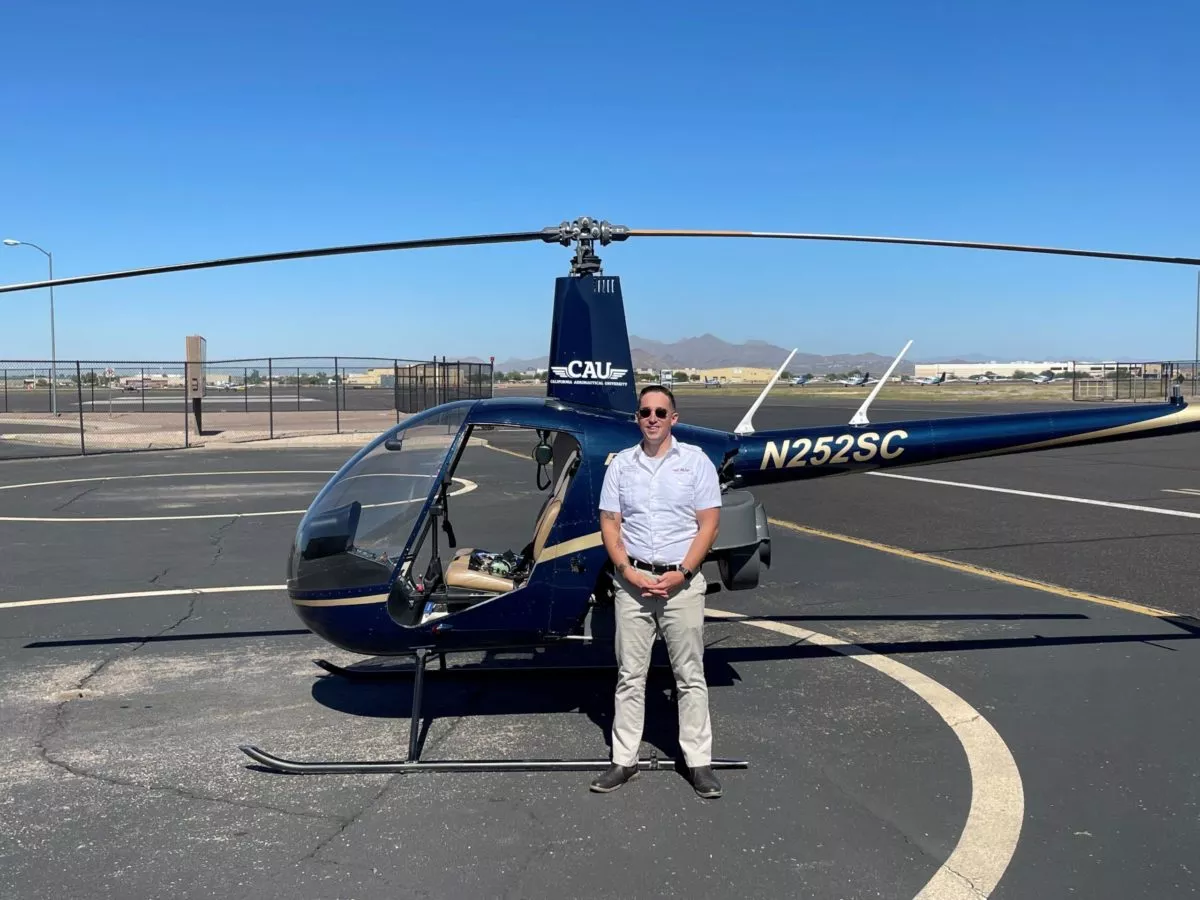Are you interested in a career in rotorcraft? Here are eight helicopter pilot requirements to know before you begin your journey.
Rotary-wing flying is an exciting world. Unlike a conventional airplane, you can land pretty much anywhere, not to mention being able to hover and even fly backward.
If you consider learning to fly, helicopters are a viable option with many exciting avenues to explore. But before you embark upon this adventurous path, you will want to know the helicopter pilot requirements. We have assembled a list of 8 things to know when it comes to becoming a helicopter pilot.
How to Become a Helicopter Pilot
Check Your Eligibility
Often the first thing prospective helicopter pilots ask is, “Am I eligible?”
The good news is that helicopter pilot requirements to start your journey are fairly easy to satisfy. 4 basic requirements must be met before you can enroll in flight training.
You will need to be:
-
At least 16 years of age
-
Able to speak, write and read English fluently
-
A high school graduate with a diploma or equivalent
-
Medically fit to earn an FAA medical certificate
Application
Any journey starts with a first step. In this case, that step is your initial application. Most good flying schools will have a set admissions process. This is normally a simple form that you fill in to register your interest in enrollment.
From there, you may have to attend an interview or a selection. The simplest thing to do, if you are unsure, is to ask.
Helicopter Pilot License Requirements
The FAA doesn’t hand out helicopter pilot licenses to anyone. In fact, many goals must be met to be awarded your pilot’s license. According to the FAA, to become a helicopter pilot, you must satisfy the following criteria:
Flight Training
-
Fly a minimum of 40 hours. This must include:
-
20 hours of flight time with a flight instructor
-
3 hours of cross-country flight experience
-
3 hours of night flying
-
10 take-offs and landings
-
A minimum of 10 hours of solo flight time
-
A complete solo cross-country flight of more than 50 nautical miles
-
-
Pass a written test
-
Pass an oral test
-
Pass a final skills test with an FAA-approved examiner
There are many helicopter pilot requirements, and there is a lot to learn, so it makes sense that you give yourself the best possible chance of success. Those who attend a good quality aeronautical university and put in the time and effort to study often have the best chance of passing the above first time.
You can visit the FAA website for more information.

Set a Realistic Time Frame
Building excellence takes time.
The above helicopter pilot requirements are the bare minimum for obtaining a helicopter pilot license in the United States. You will need to study and work hard in order to succeed, so you need to create a realistic time frame.
The good news is that by choosing a good quality flight training school with qualified flight instructors who prioritize safety, you may be able to benefit from an efficient timeframe.
Pick a Good Quality Flight School
Your choice of helicopter flight school will directly impact how long it takes to complete your helicopter flight training, how much it might cost you, and ultimately, how good of a helicopter pilot you will be at the end of the training.
Your flight training is the rock upon which you will build your skills going forward, so you need a firm foundation.
CAU provides structure to give you an accelerated pathway that may work best for you, ensuring you’re on a fast track to acquiring your license and other certificates/ratings.
At California Aeronautical University, most students will be flying in the first term of school. With a dedicated team of certified flight instructors who follow a structured flight plan, students can enjoy an accelerated pathway to earn up to 4 certificates and ratings, including a helicopter pilot’s license.
Here are some other advantages:
-
Ground-based training, including simulators
-
Real hands-on experience
-
In-house instruction from CAU staff
-
Consistent weather and flying conditions
-
You can gain a degree and learn to fly a helicopter at the same time
Funding Requirements
One perceived barrier to learning to fly a helicopter is affordability.
The solution?
Have you considered looking into whether you qualify for financial assistance? Why not take a look here and see if you could be eligible to gain help in covering the cost of your flight training school?
Go Prepared
Learning to fly a helicopter is challenging. Not only will you be required to learn all of the theory behind rotary-winged aircraft, but you will also have to put that knowledge into practice with many hours of flight time.
If you dedicate yourself to this career path and prepare for each lesson and exam, your hard work can pay off.
California Aeronautical University offers you a degree as well as a helicopter pilot’s license. As part of our Associate of Science in Aviation Studies program, you can earn four certificates and ratings and graduate in around two years.
Consider a Career Path
With that commercial license in your hand and a degree, you have a variety of career opportunities.
In what direction will you head next?
Commercial Helicopter Pilot
Here are some great options for commercial helicopter pilots:
-
Tour operator
-
Medical helicopter pilot
-
Police helicopter pilot
-
Logistical pilot
-
Search and rescue
-
Flight Instructor
There are countless further career paths. By enrolling at an aviation college, you can have an opportunity to network with potential employers, and it can make it easier to get that first foot in the door and fly commercially.
Attending a good flight school with a professional pilot program is an investment in your own future and career. Many will continue to support you and offer valuable careers advice, even after you graduate.
Obtain Your Helicopter Pilot License at CAU Today
Helicopter pilot license requirements go beyond mere rules regarding hours. There is actually quite a lot to think about.
At CAU, you can gain a degree and a commercial helicopter license at the same time. You will have access to an in-house team of qualified flight instructors, future employers and university partners, and a wealth of knowledge and experience.
What are you waiting for? Why not contact CAU today and find out whether your next job could be flying helicopters with your commercial license?
Ready to soar in your aviation career?
Mr. Matthew A. Johnston has over 23 years of experience serving various roles in education and is currently serving as the President of California Aeronautical University. He maintains memberships and is a supporting participant with several aviation promoting and advocacy associations including University Aviation Association (UAA), Regional Airline Association (RAA), AOPA, NBAA, and EAA with the Young Eagles program. He is proud of his collaboration with airlines, aviation businesses and individual aviation professionals who are working with him to develop California Aeronautical University as a leader in educating aviation professionals.

Want to become helicopter pilot
Hi Deshandhu, thank you for your comment! We’d love to speak more with you about our helicopter pilot training! Please contact our admissions team at 661-490-9583. We look forward to speaking with you!